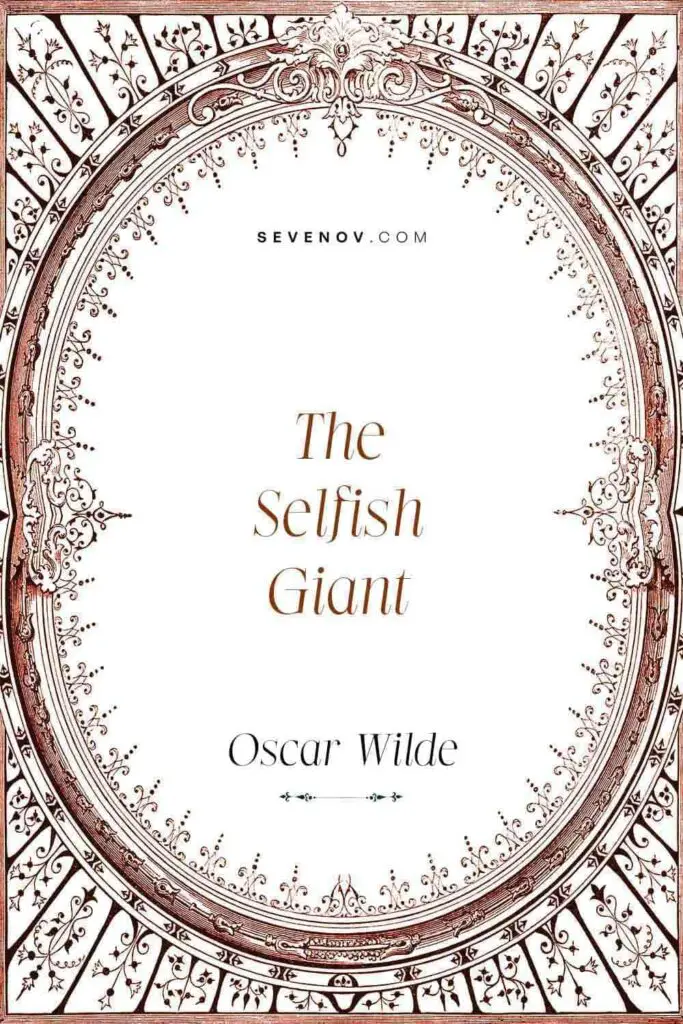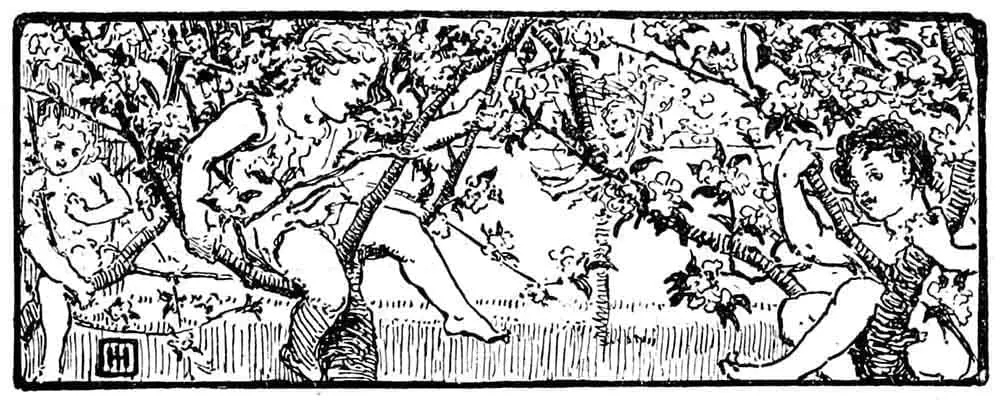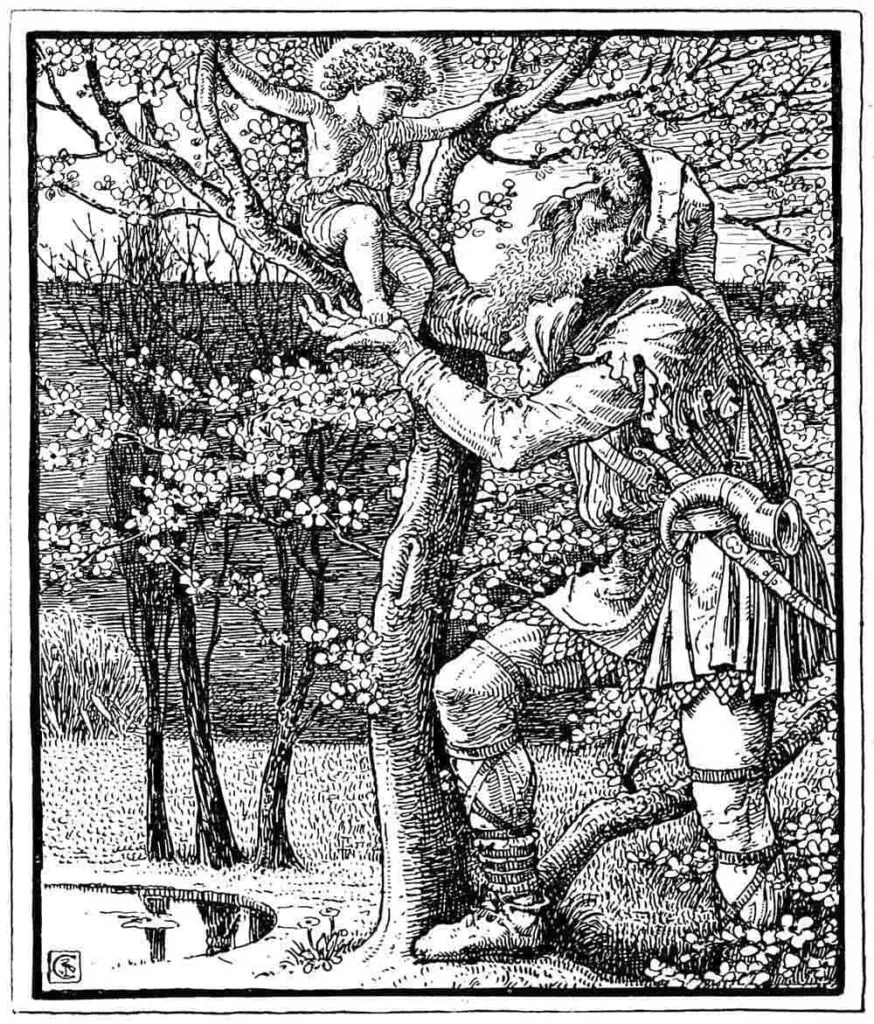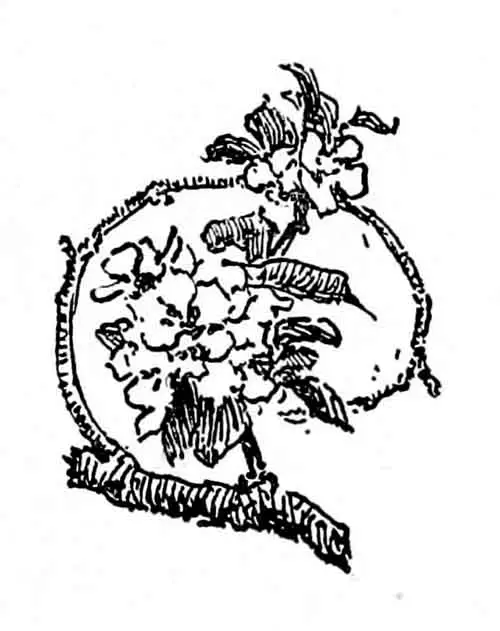
The Selfish Giant by Oscar Wilde
Author: Oscar Wilde
Published: May 1888
Genre: Fairy Tale, Short Story
“The Selfish Giant” is a short story written by Oscar Wilde, part of his collection of short stories titled The Happy Prince and Other Tales, published in May 1888. Other short stories in this collection are “The Happy Prince,” “The Nightingale and the Rose,” “The Selfish Giant,” “The Devoted Friend,” and “The Remarkable Rocket.” In this tale, a giant constructs a wall to keep kids out of his garden, but after seeing their innocence, the Giant develops compassion.
1. The Selfish Giant Synopsis
“The Selfish Giant” is a classic fable about an arrogant giant who kept all the children from playing in his garden. Initially, he opposes visitors from coming to his garden, going as far as to shun them by building a tall fence surrounding the greenery, thus banning the children from returning. As winter arrives and spring is right around the corner, the Giant awaits for his garden to come alive with flowers, but his ground remains barren.
Days go by, and not a single bloom sprouts, which causes the Giant to worry that spring may never arrive. One morning, he wakes up to the laughter of the children playing outside and is relieved to see the warm embrace of spring in his garden again. The kids enter his garden through a small hole in his fence, and he runs out to play with them.
The Giant noticed a small boy stuck atop a tree as he played. He lovingly brought the boy down to safety. When the Giant asked for his name, the kid ran away. From then on, the Giant waited patiently for his little friend to return daily, but sadly, he never did.
After many years, the Giant was old, and he awoke one morning to see his little friend in his blooming garden. He quickly ran out, and the child revealed he was Christ Child and had come to take him to Heaven with him. The Giant dies peacefully, and his soul rests in Heaven with God.
2. The Selfish Giant Summary
Every afternoon after school, children play in the Giant’s large, lush garden, with peach trees, flowers, and birds chirping. The Giant, however, returns home one day after a seven-year holiday with his friend, an ogre. As a result, he has left his space unsupervised, allowing the children to visit the property frequently. Furious at the kids for playing in his garden, he kicks them out. The Giant then builds a tall wall around his garden and hangs a sign threatening trespassers with a prosecution.

The dejected kids are forced to find another spot to play. They attempt to play in the street but find it stony and dusty; as a result, they go back to the Giant’s estate and spend their afternoons trekking around the high wall while lamenting the loss of the garden and the joy it once brought them.
Soon winter arrives, and spring comes next, but the Giant’s garden is still stuck in winter because springtime empathizes with the children and does not show up while their tiny companions are gone. This unexpected change of events only pleases the forces of winter, who permanently settle in the garden.
The snow and the frost cover everything in white while the north wind wreaks havoc, bringing down the Giant’s chimney pots. Hail destroys the mansion’s roof. Due to the Giant’s selfishness, spring, summer, and autumn all fail to materialize, leaving the Giant alone, lonely, and bewildered. He hopes for a change in the weather, wondering why spring’s arrival is delayed.
The Giant wakes up one morning to what he believes to be beautiful music outside his window. It sounds so sweet that he thinks it’s from the King’s musicians. The Giant has not heard a singing bird for a long time; thus, it sounds incomparably beautiful to him, even if only a linnet is chirping. The Giant then learns that winter has abandoned the siege on his house, and the scent of flowers is now coming through the window. Finally, spring has arrived.
The Giant looks outside and finds a fantastic sight because the kids are back, and springtime has returned to his garden. To the delight of the birds and trees, the children snuck inside through a gap in the wall and are now playing inside like before. Only the furthest corner of the garden is still covered in snow, and there, a young child who is too tiny to climb the nearby tree is alone and in tears.
The Giant is moved by this scene, which melts his heart. He recognizes that his egotism was what kept spring away. He promises to atone by making his garden a playground for the children for all eternity. The moment the Giant steps into the garden, they all run away from him in terror, and the garden turns frigid and freezing.
Only the young boy in the back is still there because the Giant is not visible to him due to his teary eyes. The Giant gently approaches him from behind, scoops him up, and sets him in the tree. The tree suddenly blooms, birds start singing, and the child gives the Giant a kiss of gratitude.

The kids understand the Giant now has good intentions after seeing this. They bring spring with them when they return to the garden. The Giant uses his axe to destroy the wall, symbolically forming a friendship between him and the children.
The Giant, who has grown particularly fond of the small boy, wants to know more about him as the children wave goodbye. The kids do not know where he went, where he lives, or even who he is because they have never seen him before. This makes the Giant sad; although he will now see the kids every afternoon and enjoy their company, the memories of his first tiny companion will always linger.
After some time, the Giant begins to appreciate the children more than his garden, referring to them as “the most beautiful flowers of all.” Now an old man, he relaxes in an armchair while watching the children play.
The Giant awakens to a miraculous sight one morning in winter. In the furthest corner of the garden, the tree has changed, covered in white blossoms and silver fruit. The same young boy who had attempted to climb the tree is beneath its branches, appearing to be no older than he was then.
The Giant hurries to greet his friend but stops when he notices that the young boy’s hands and feet carry wounds caused by nails that have punctured them. The Giant, furious that anyone would harm a child, much less his first and closest friend, swears to bring the offender to justice with his strength. However, the child declines, calling them the scars of love. The Giant, sensing that he is not in the presence of a typical child, bows respectfully before the boy and asks who he is.
Instead of directly replying, the young boy says, “You let me play in your garden once; now, you shall accompany me to my garden, which is Paradise.” That afternoon, when the children seek out the Giant, they discover his lifeless body, white petals strewn all over him.

Characters
The Giant – Initially a selfish creature, the Giant is annoyed by the children who play in his garden while he is gone. However, his heart thaws over time when he sees why spring and summer avoid his garden. Once he lets the children back in, he feels particularly compassionate toward a small boy trying to ascend a tree.
The Child – The boy is the only child unafraid of the Giant. His innocence warms the Giant’s heart, leading to him breaking down the walls surrounding his property. The child never comes back to the garden until many years later. He is still a child, even though the Giant has grown very old, and he bears the stigmata, revealing himself to be Jesus. He only comes back to take his friend the Giant up to Heaven.
3. Themes
3.1. Arrogance and Greed
The Giant represents the worst of human nature, embodying vices such as arrogance and greed. His heart is closed off to any feelings of affection, and instead, he lives a life of anger and pride. His pride in his garden is such that he is unwilling to share it with anyone, not even innocent children, and finds their presence annoying.
3.2. Isolation
The Giant does not want any company as he does not want anyone else to share the beauty of his garden. He threatens and scares everyone, including small children. The Giant’s rude behavior isolates him and leaves his garden wintry and frozen. He is selfish and thus finds himself all alone.
3.3. Love and Compassion
The small child that the Giant helps thanks him for the help and kisses him on the cheek out of gratitude. This token of love and appreciation melts the Giant’s seemingly cold heart, and he demolishes the garden walls. He enjoys letting kids wander and play inside his garden and even joins them in all the frolics. The warm emotions of compassion and care change the Giant’s view of others and make him more content and happy in his own life. Finally, he finds solace and dies in peace.
3.4. Salvation
The story’s central theme is salvation and saving oneself from the ultimate punishment of a loveless life. The Giant was all alone because he did not show love to others. He considered them a nuisance.
However, when he realizes that the small children only want to play and smile, he welcomes them into his garden. The spring brought blossoming flowers through those children, and finally, the Giant found love and affection.
4. Writing Style
This particular story was not written in Wilde’s typically subversive style, with a lean towards didactic moralizing. By focusing on its central lesson, Wilde shines a spotlight on spirituality, external beauty, and religious morals. As his prose resembles a traditional folktale, it proves how enduring and relevant fairy tales are in storytelling, regardless of era or culture.
5. Influence on pop culture and Legacy
5.1. Influence on Music
Throughout the 20th century, “The Selfish Giant” was the source of many reinterpretations. English singer Liza Lehmann composed the earliest adaptation of the same title in 1911. Eric Coates, an English light music composer, wrote the stunning orchestral Phantasy The Selfish Giant in 1925. Between 1933 and 1934, Jenő Hubay, a violinist-composer, made a Hungarian language opera adaptation named Az önző óriás (Der selbstsüchtige Riese), Op. 124.
5.2. Influence on Film
In 1971, an animated version of “The Selfish Giant” was written and produced by Peter Sander, with music by Ron Goodwin, for CTV in Canada. It was first broadcast in November of that year. It earned a nomination at the 44th Academy Awards (1972) for Animated Short Subject.
In an extra twist to a biographical drama, the 1997 film Wilde weaves in portions of “The Selfish Giant,” with Wilde and his wife telling the story to their children interspersed with Oscar ruminating on his relationship with his chidlren and his lovers. The sorrow of the children who can no longer play in the Giant’s garden is mirrored with the sadness of Wilde’s sons as their father devotes more time with his lovers than with his family.
6. Quotes from The Selfish Giant
He did not hate the Winter now, for he knew that it was merely the Spring asleep, and that the flowers were resting.
And the child smiled on the Giant, and said to him, ‘You let me play once in your garden, to-day you shall come with me to my garden, which is Paradise.’




